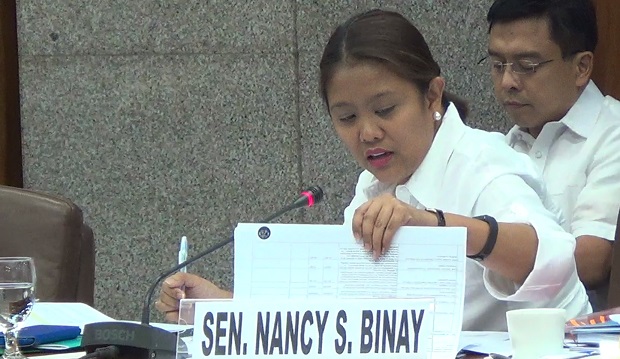
Senator Nancy Binay. INQUIRER FILE PHOTO
MANILA, Philippines—Senator Nancy Binay on Tuesday slammed the new travel policy, saying it is “very restrictive to travelers yet inconclusive in stopping human trafficking.”
Instead of “burdening travelers with taxing documents,” the head of the Senate committee on tourism then urged the Inter-Agency Council Against Trafficking (Iacat) to just focus more on using technology to improve profiling.
“Yung technology naririyan para safe, secured and convenient ang mga pasahero. Malaking tulong din ang technology to curb human trafficking. Kung kaduda-duda talaga ang background ng byahero at kasamang biktima—that’s the time immigration people should do their jobs of cross-checking the info they have in their database and compare it to the claims of the person in question,” Binay said in a statement.
(The technology is there to ensure that passengers are safe, secure, and have a convenient experience. Technology also plays a significant role in curbing human trafficking. When the background of a traveler and their accompanying individuals raises suspicion, that’s when immigration officials should diligently perform their duties by cross-referencing the information they possess in their database with the statements provided by the individual in question.)
“Let’s maximize the use of information technology to correctly profile travelers,” she added.
For Binay, stricter rules should only be imposed to travelers going to countries that require no visa and have high human trafficking cases
“…In this instance, cross-referencing is necessary to verify the background of a specific traveler,” she pointed out.
The senator added that since passengers already have the option to check-in online, the system can already be linked to a highly secured database where red flags are forwarded to authorities.
“With the advancement of technology in airports and the integrated immigration watchlist of governments, analytics or ‘risk scoring algorithms’ can be an extra safeguard to assess high-risk individuals based on a combination of factors like travel behavioral patterns, etc that would warrant further investigation,” she said.
“And since inter-agency naman ang konsepto ng international law enforcement on human trafficking, dapat predictive analytics and facial recognition na ang profiling ng mga byahero.”
Starting September 3, additional documents for self- funded travels would be required for outbound Filipino passengers like confirmed roundtrip ticket, proof of accommodation, financial capacity, purpose of travel, proof of employment, and other equivalent documents.
A Philippine Statistics Authority-issued birth or marriage certificate and notarized documents, however, are among the documents that will be required for sponsored travels.
“These additional documents are coercive, restrictive and redundant,” Binay said, particularly referring to the notarized documents.
The senator said she hopes the Department of Justice and the Bureau of Immigration can just assign immigration officers who are “well-trained to interpret data contextually and make informed decisions based on the info at hand.”
“Of course, human judgment is prone to mistakes, that’s why oversight is essential. Kaya dapat trained professional ang nasa frontlines to treat every traveler with respect and sensitivity, at magkaroon tayo ng mechanisms to address false positives to protect an individual’s rights,” she said.